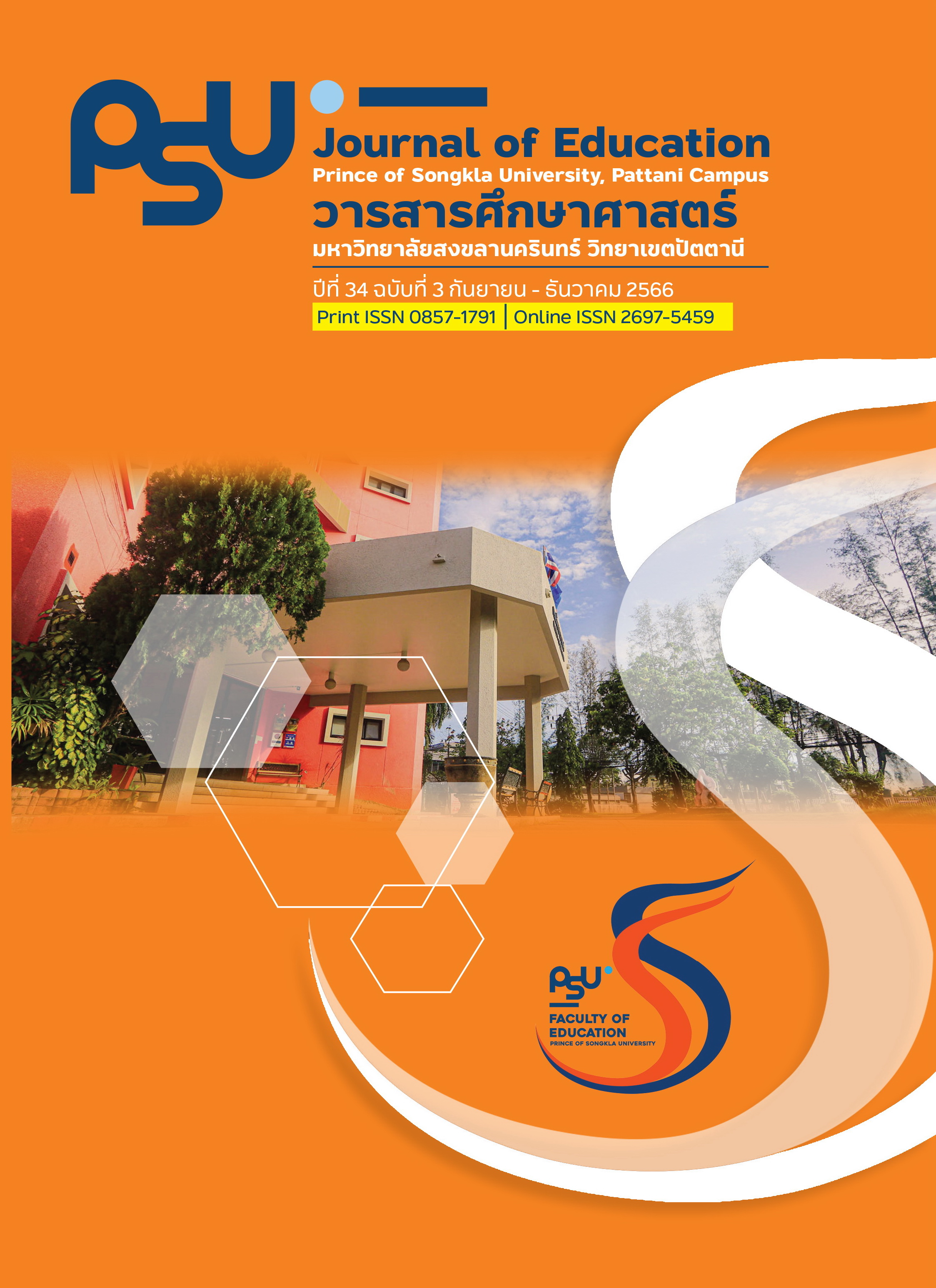การขับเคลื่อนกระบวนการผลิตครูคุณภาพฐานสมรรถนะ โดยบูรณาการแนวคิดจิตตปัญญาศึกษา ระบบพี่เลี้ยง และการวิจัยเป็นฐานของมหาวิทยาลัยราชภัฏ ระยะที่ 1
Main Article Content
บทคัดย่อ
การวิจัยเชิงปฏิบัติการแบบมีส่วนร่วมครั้งนี้มีวัตถุประสงค์ 1) เพื่อสนับสนุนการขับเคลื่อนและแลกเปลี่ยนเรียนรู้ระหว่างมหาวิทยาลัยและเครือข่ายมหาวิทยาลัยราชภัฏ 2) เพื่อสังเคราะห์กระบวนการบริหารจัดการและผลในภาพรวมที่ตอบโจทย์การผลิตและพัฒนาครูของมหาวิทยาลัยราชภัฏ และ 3) เพื่อสนับสนุนเชิงนโยบายในการสื่อสารในที่ประชุมสภาคณบดี ที่ประชุมอธิการบดีมหาวิทยาลัยราชภัฏ และภาคส่วนที่เกี่ยวข้อง ประชากร ประกอบด้วย บุคลากรสายวิชาการคณะครุศาสตร์/ศึกษาศาสตร์/วิทยาลัยฝึกหัดครู/คณะครูโรงเรียนเครือข่ายฝึกประสบการณ์วิชาชีพครูของมหาวิทยาลัยราชภัฏ กำหนดขนาดกลุ่มตัวอย่างแบบเฉพาะเจาะจงเป็นอาจารย์ผู้สอน อาจารย์นิเทศ ครูพี่เลี้ยง และนักศึกษา 3,390 คน ใช้ชุดความรู้ขับเคลื่อนประเด็นสาธารณะ แบบการถอดบทเรียน และแบบประเมินผล
เป็นเครื่องมือในการเก็บรวบรวมข้อมูลด้วยการจัดประชุมเชิงปฏิบัติการ 3 ครั้ง และวิเคราะห์ข้อมูลด้วยการวิเคราะห์เนื้อหา และใช้สถิติเชิงพรรณนา ได้แก่ ค่าเฉลี่ย และค่าส่วนเบี่ยงเบนมาตรฐาน ในการวิเคราะห์ข้อมูลการประเมินผล
การวิจัยพบว่า 1) มีการสนับสนุนการขับเคลื่อนและแลกเปลี่ยนเรียนรู้โดยการวางแผนกรอบการทำงานร่วมกันในระดับประเทศ 2) การสังเคราะห์กระบวนการผลิตครูคุณภาพฐานสมรรถนะได้ 6 ขั้น คือ (1) ขั้นเตรียมความพร้อม (2) ขั้นออกแบบ (3) ขั้นนำไปใช้ (4) ขั้นสะท้อนความคิด (5) ขั้นซ่อมเสริม (6) ขั้นรายงานผล โดยผลในภาพรวมและรายด้านของการใช้กระบวนการผลิตครูคุณภาพฐานสมรรถนะอยู่ในระดับปานกลาง ซึ่งด้านสมรรถนะตามมาตรฐานวิชาชีพครูของคุรุสภา พ.ศ. 2562 อยู่ในระดับปานกลางเป็นอันดับสุดท้าย 3) การสนับสนุนเชิงโนบายในการสื่อสารทุกภาคส่วนจะต้องมีการนำเสนอกระบวนการ และผลการดำเนินงานเพื่อกำหนดนโยบายและติดตามทิศทาง การผลิตครูของมหาวิทยาลัยราชภัฏร่วมกันอย่างเป็นระบบและต่อเนื่อง
Article Details

อนุญาตภายใต้เงื่อนไข Creative Commons Attribution-NonCommercial 4.0 International License.
เอกสารอ้างอิง
Boud, D., Dawson, P., Tai, J., & Ajjawi, R. (2018). Creating an Agenda for Developing Students’ Evaluative Judgement. In Developing Evaluative Judgement in Higher Education: Assessment for Knowing and Producing Quality Work, edited by D. Boud, R. Ajjawi, P. Dawson and J. Tai, 186–197. Routledge.
Carayannis, E. G., Jancelewicz, J. M. (2022). The Futures of Europe: Society 5.0 and Industry 5.0 as Driving Forces of Future Universities. Journal of the Knowledge Economy, 05 January 2022. https://doi.org/10.1007/s13132-021-00854-2
Chen, L., Howitt, S., Higgins, D., & Murray, S. (2022). Students’ Use of Evaluative Judgement in an Online Peer Learning Community. Assessment & Evaluation in Higher Education, 47 (4), 493–506. doi:10.1080/02602938.2021.1933378.
Chiawiwatkul, U. (2010). Participatory Action Research: Concepts, Principles and Lessons. (2nd ed.). Bangkok: P. A. Living. [in Thai]
Contemplative Education Center, Mahidol University. (2009). What is intellectual education. In Project Academic Documents Learning to Change Center. Nakhon Pathom: Contemplative Education Center, Mahidol University. [in Thai]
Dangprasert, S., & Kamtab, P. (2019). The development of Competency-Based Curriculum Structure based on the Occupational Standard. Journal of Technical Education Development, 32(112), 27-36. [in Thai]
Dechakupt, P. (2015). Learning management in the 21st. Bangkok: Chulalongkorn University Press. [in Thai]
Heriot Watt University. (2014). Academic Mentoring: Policy and Guidelines. NY : Mcgraw-Hill. Jorasa, C. (2017). An Action Research on Development of analytical thinking in Geography learning by research–based approach of Matthayom Suksa 5 student, Phosai Pittayakarn School, The Secondary Educational Service Area Office 29. Thesis, Master of Education, Department of Educational Research and Evaluation, Ubon Ratchathani Rajabhat University. [in Thai]
Kotur, P. F. (2022). Is the competency-based curriculum, evidence-based?. Indian Journal of Anaesthesia, 66(2), 164-165.
Likert, R. (1967). The Method of Constructing and Attitude Scale. Attitude Theory and Measurement. Fishbeic, Martin, Ed. New York: Wiley & Son.
Luo, J., & Chan, C. K. (2022). Conceptualising evaluative judgement in the context of holistic competency development: results of a Delphi study. Assessment & Evaluation in Higher Education, 1-16.
Marcotte, K. M., & Gruppen, L. D. (2022). Competency-Based Education as Curriculum and Assessment for Integrative Learning. Education Sciences, 12(4), 267.
Mohamed, B. H., Disli, M., Al-Sada, M. b. S., & Koc, M. (2022). Investigation on Human Development Needs, Challenges, and Drivers for Transition to Sustainable Development: The Case of Qatar. Sustainability 2022, 14, 3705. https://doi.org/10.3390/su14063705
Nyaboke, R., Kereri, D., & Nyabwari, L. (2021). Competence-based curriculum (CBC) in Kenya and the challenge of vision 2030. International Journal of Education, Technology and Science, 1(4), 155-169.
Oliveira, K. K. D. S., & de SOUZA, R. A. (2022). Digital transformation towards education 4.0. Informatics in Education, 21(2), 283-309.
Panich, V. (2013). Ways to create learning for students. (3rd ed.). Bangkok: Tathata Publication. [in Thai]
Panich, V. (2015). Trends in Educational Institution Administration in the 21st Century. Special Lecture by Professor Dr. Vicharn Pahich, Hat Yai University. [in Thai]
Phunphatrachewin, J. (2016). Futures Research. Bangkok: National Research Councill of Thailand. [in Thai]
Ramírez-Montoya, M. S., Castillo-Martínez, I. M., Sanabria-Z, J., & Miranda, J. (2022). Complex thinking in the framework of Education 4.0 and Open Innovation-A systematic literature review. Journal of Open Innovation: Technology, Market, and Complexity, 8(1), 4.
Rattanaprom, W. (2018). Research-Based Learning; RBL. Suratthani Rajabhat Journal, 5(2), 37-60. [in Thai]
Robson, P. (2002). The economics of international integration. Routledge.
Rwigema, P. C., & Andala, H. (2022). The influence of teacher related factors on the implementation of the competency-based curriculum in Rwanda. A case study of public primary schools in Kicukiro District. The Strategic Journal of Business & Change Management, 9(1), 16-30.
Sanguanrat, S., & Parunggul, C. (2021). Curriculum and competency-based teaching in school. The Journal of Sirindhornparithat, 22(2), 351-364. [in Thai]
Secretariat Office of the Teachers Council of Thailand. (2020). (Manuscript) Annual report 2019. Bangkok: Secretariat Office of the Teachers Council of Thailand. [in Thai]
Sinlarat, P. (2014). Principles and techniques of teaching in higher education. (4th ed.). Bangkok: V. Print (1991). [in Thai]
Siriwan, S. (2014). Coaching to develop excellent performance. Bangkok: HR Center. [in Thai]
Sri-saard, B. (2017). Preliminary research. (10th ed.). Bangkok: Suwiriyasan. [in Thai]
Sukpraseat, S., Suphapanworakul, M., & Onthanee, A. (2018). The Learning Society : In Education the 21st Century. Education Journal Faculty of Educatin Kamphaengphet Rajabhat University, 3(5), 76-95. [in Thai]
Tai, J., Ajjawi, R., Boud, D., Dawson, P., & Panadero, E. (2018). Developing Evaluative Judgement: Enabling Students to Make Decisions about the Quality of Work. Higher Education, 76(3), 467–481. doi:10.1007/s10734-017-0220-3.
Techanok, A., Jaronggsirawat, R., & Phra Honda Vatasatto. (2020). Educational Management in the 21st. Journal of MCU Nakhondhat, 7(9), 1-15. [in Thai]
Trithayapoom, C. (2015). Business definition: Human Resource Management. TPI. http://www.uptraining.co.th/feedarticle/231- coaching-trip [in Thai]
Wasi, P. (2006). Public Policy Process. Bangkok: National Public Health Foundation. [in Thai]


